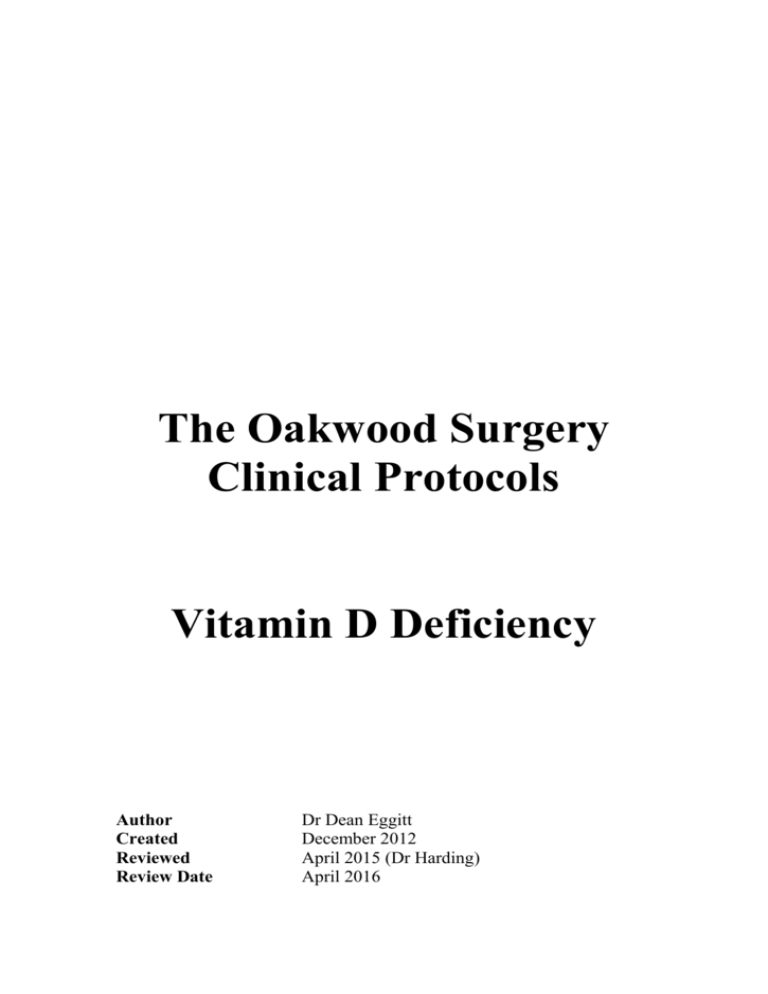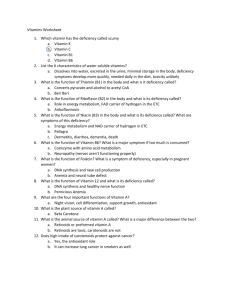The Oakwood Surgery
advertisement

The Oakwood Surgery Clinical Protocols Vitamin D Deficiency Author Created Reviewed Review Date Dr Dean Eggitt December 2012 April 2015 (Dr Harding) April 2016 Background Vitamin D deficiency is common in the UK. It is especially common in individuals with dark skin and those who do not get regular prolonged exposure to direct sunlight. This includes office workers and those in residential and care homes. Vitamin D deficiency should also be considered in those at risk of malabsorption e.g. inflammatory bowel disorders, cystic fibrosis and coeliac disease; osteopenia on x-ray or osteoporosis. You should also consider this in children reluctant to weight bear. Long term vitamin D deficiency in can lead to rickets in children and osteomalacia in adults. Presentation is usually with non-specific pains, tiredness and weakness. Diagnosis Diagnosis of vitamin D is based upon clinical history and laboratory confirmation of low vitamin D. If vitamin D deficiency is considered, then test for serum Vitamin D. If this comes back <75, then also request parathyroid hormone, which needs to be done at DRI. Vitamin D deficiency Vitamin D insufficiency = = 25 OH D 25 OH D < 30 30-50 50-75 (Treat) (Supplement) (Life style advice) Treatment Vitamin D deficiency <30 Pro D3 Capsules 20,000 Units - 5 capsules stat once a month for 3/12. Then 1/12 after last dose needs bloods – vitamin D and PTH (to be taken at DRI) and for further treatment to be determined based on the level of Vit D. Vitamin D insufficiency level between 30-50 Pro D3 Capsule 20,000 units – 5 capsules stat Followed by Fultium D3 800 Units daily long term. Vitamin D insufficiency level between 50-75 Lifestyle advice as below: Dietary Advice for all patients Oily fish, cod liver oil, fortified breakfast cereals, dairy products, liver and egg yolks. Sunlight 20-30mins on face and forearms at midday in the summer 3x/week without sunscreen. http://www.patient.co.uk/health/vitamin-d-deficiency-including-osteomalacia-and-rickets Follow Up If being treated for Vitamin D deficiency, (i.e. <30) - Vitamin D and PTH after 4 months from starting treatment at DRI. Otherwise, no further monitoring is required Referral Is indicated if: Abnormal baseline parathyroid hormone Persisting abnormal corrected calcium (with or without normal vit D levels) Persons under the age of 18 If no response to high dose vitamin D treatment after 3 months






